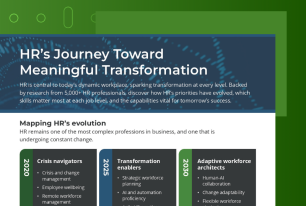USB’s Secret to Success in Finding the Best of the Best Students
What businesses can learn from the University of Stellenbosch Business School in attracting and selecting current and future potential.
Share
Success in Selecting Future Business Leaders
Is there a magic ingredient for predicting academic performance when selecting future business leaders? Organizations investing in the development of their employees would be wise to consider the approach taken by academic institutions to student selection. Best in class academic institutions have a holistic and objective process based on multiple data sources and know which data predicts academic performance. This ensures better academic performance and, ultimately, greater success as a leader.
Academic institutions aim to select students more likely to fully realize the benefits of further education, becoming knowledgeable and skilled graduates. An institution’s success, and that of its graduates, ensures that it continues to attract the ‘best of the best’, giving the institution the opportunity to develop exceptional leaders in a highly competitive business world. The University of Stellenbosch Business School (USB), a triple-accredited African Business school, offers a world-class master’s in business administration (MBA) program. USB is passionate about the success of their graduates driven by a strong need to ensure students excel, exiting the MBA program with knowledge and a skillset that will equip them to lead and improve the performance and profitability in any organization.
While there are a variety of approaches and tests used in the attraction and selection of top-caliber students, USB has found the key to accurately identifying potential on both their MBA and Post Graduate Business Management programs. USB chose the OPQ and SHL Verify to complement its approach, which takes into account a variety of quantitative and qualitative criteria. So, how do they use the insight gained from objective selection data in their selection process?
Relying on academic performance during school is generally a poor predictor of future success.
An All-Inclusive, Holistic Approach
Relying on academic performance during school or undergraduate studies is generally a poor predictor of future success, more so when used in isolation. USB embodies the value of inclusivity and gathers a complete picture of student capability by measuring personality attributes, aptitude, cognitive ability, motivation and management competency potential. Prior academic results and working experience are used to complement the picture. This holistic approach provides USB with multiple data points for selecting and predicting future leadership effectiveness.
Accuracy and Consistency
USB ensures that they use assessment tools proven to be both valid and reliable. Studies conducted in both 2012 and 2019 found significant relationships between MBA graduate academic results and SHL personality (OPQ) and cognitive ability assessment (SHL Verify) scores. These findings support USB’s continued and consistent use of the SHL assessments to help predict future business leaders’ MBA performance.
Selecting and Developing for Africa
USB’s MBA has been ranked as the top program in Africa (by Universal, an international rating agency). With over 28,000 alumni from all corners of the world and a strong global influence, they have a compelling commitment to develop business leaders for the African continent. This commitment underpins the University’s use of tools relevant and valid to the South African and broader African context. SHL assessments aim to reduce cultural bias to provide objectivity, fairness and relevant comparison populations.
Unlike tests used by other business schools, the SHL assessments mean no lengthy preparation is required.
Attracting Potential through a Positive Experience
Just as a positive candidate experience is good for business in recruitment, a positive experience during student selection affects perceptions of the academic institution. USB has found the assessment experience to be a key benefit, and differentiator, in their approach. Unlike tests used by other business schools, the SHL assessments mean no lengthy preparation is required, assessment times are shorter, and access is simplified by using an intuitive online platform.
In addition, SHL and USB collaboratively provide feedback for student development through individual reports, group workshops, and personal reflection/discussion opportunities as part of the leadership discourse. This end-to-end shared and reflective approach is central to the learning and development of students and is is a key component of USB’s programs.
Current and Future Potential
USB’s experience has shown that although performance in prior academic pursuits and work experience can assist somewhat, objective measurement for future performance and competency potential is a differentiator.
This objective approach allows prospective students a fair and equal chance to showcase both their current and future performance potential. Organizations looking to invest in an employees’ MBA or Postgraduate Business Management qualification can have confidence that USB selects on those criteria that drive academic success. The resultant academic success unlocks the potential that transforms employees into great business leaders.
Read more on why USB chooses SHL for their prediction of academic performance of future business leaders, please visit https://www.usb.ac.za/choosing-shl-over-gmat/









